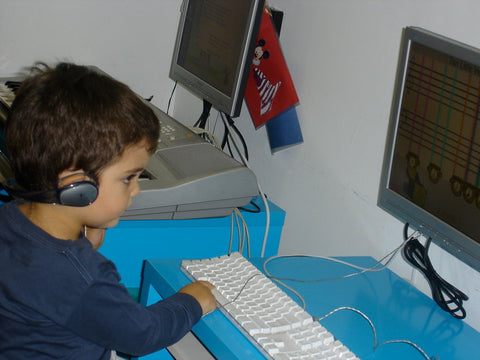Preparatory C (from 5+). Lesson 20

Your FREE Demo version is here
Your full version access is here
Nurturing Healthy Self Esteem in Piano Students
The little person wants to learn and to do it well. Our task is to help him with this, but in such a way that the child relies primarily on his own resources. It is not by chance, when a child is learning to walk and talk, he often says, 'I want to do it myself!'
Your task is to strengthen the healthy self esteem of the child, teach him to realistically evaluate the results of his work and not to look for support or praise from others. You should teach the child to put achievable objectives before himself, compare the result with what he has done before and always strive for advancement.
Below are some guidelines, which should be remembered when working with young students:
- You don't need to use a high pitched voice and talk to the child like a baby.
- You shouldn't praise the child because he is 'cute' or 'funny' or even 'clever.' These words are generalities.
- Praise him for specific actions and achievements.
- The best form of encouragement is the musical money. It is neutral and does not carry the danger of appearing biased or inattentive. Despite their young age, young learners are easily able to discern the mood of those around them.
- Kid's pride in their achievements can develop only on the basis of respect for your opinion. Respect grows, when a child sees that you pay careful attention to his results and that you don't overstate his accomplishments.
- It is especially important not to feed your child or student with exaggerated enthusiasm: since you can inflate the self-esteem of the child and disturb his balanced self monitoring.
- Ask him to play the piece with his left hand, right hand or both hands at least twice. Before the second time, you should always say: 'Let's do that again and we will see if you win or you lose.' Be sure to compare the numbers obtained out loud and encourage the child for each improvement. Explain why he has won. The child learns very quickly to compare the figures.
- When working with the modules, always write down the result and explain to your kid how much he has improved or worsened. Do not give an emotional evaluation if the result is not so good. Simply state the facts and suggest that next time he tries it again, he should try to win. If the youngster wants to do it again, agree to it!
- Do not force little piano player to accept your help, do not show him 'how it should be done,' do not sing for him until he did gives his consent. You could simply ask him: 'Do you want me to show you how to do it?' If the child says 'No', you shouldn't force him. Our task is to develop his internal skills and to strengthen his desire to win, without the support of others around him.
- Never criticize a child's performance of a piece of music. He does not have to be another "Mozart!" Praise him only for what he has achieved. Even if the feat is playing one note with his index finger. This is his own personal accomplishment. It is this that will become the reference point for his successful learning. A journey of thousand miles begins with a single step./Success comes with tenacity./The road becomes better for having been walked on.
1. We continue to work on triads. Learn to play with single and two hands.
Video examples of playing with the left hand:
Video example of playing triads with two hands:
2. Exercises for setting hands O.M. Egorova "Crane".
Repetition.
![]() Treble Staff Puzzle®
Treble Staff Puzzle®
This is the last week of work on the module.
Don't forget to make entries in your diary and put photos and videos of working with this module there.
1. Reading from a sheet: Nursery Primer. Humpty-Dumpty - we play R, L and P for 2, 4, 5 and 6 presentations (no pictures). If possible, sing solfeggio.
Video example:
2.  Gentle Piano®- A play to be performed. Favorite Classic 1 "Musette": R - RH, L - LH, P - PH
Gentle Piano®- A play to be performed. Favorite Classic 1 "Musette": R - RH, L - LH, P - PH
Try to make as few mistakes as possible with a minimum time delay.
Video example:
Visit our Soft Mozart forum and start your progress diary here. Use the current year section. This is the place for you to ask questions and share your experiences.
At least 2 photos and 1-2 videos of the listed activities will count towards your child's credits for the graduation DIPLOMA. Please upload the video to You Tube, copy the address from the BROWSER window and paste it into your Progress Diary. Do not forget to indicate the year and type of work in the description of your Soft Mozart Academy photo / video.
Sincerely Yours,
Hellene Hiner

Video success:
 Would you like to receive lessons by email weekly? Subscribe to the e-mail lesson here:
Would you like to receive lessons by email weekly? Subscribe to the e-mail lesson here:
All the lesson plans:
For 2+ students
For students from 3 to 5
For students 5+
Always check here, if we have any recital! You and your child will benefit a lot from participating in our concerts!
Your place to start your progress diary is here.


